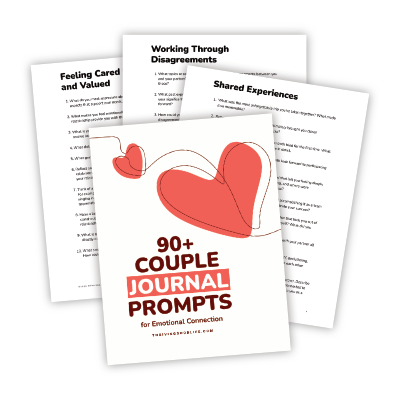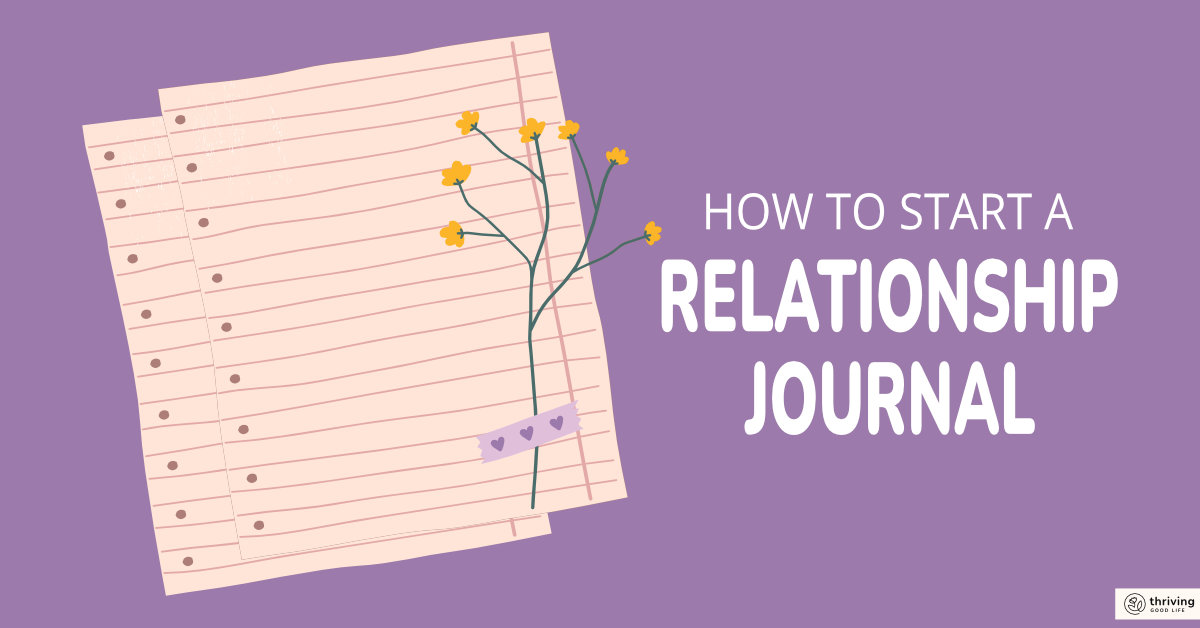Have you ever thought about starting a relationship journal with your love?
I know, it’s one of those things that sounds like a great idea, until you try putting pen to paper. Then you realise, that starting a journaling habit, one you actually stick to, is no easy feat.
In this article, we’ll cover the benefits of shared journaling, as well as how to start a relationship journal. And how to keep it going.

Want to deepen your emotional connection with your partner?
Join my exclusive email club. You’ll also get free access to a library of journaling pages, worksheets, and other printables, plus updates and special offers.
By signing up you agree to our T&Cs and Privacy Policy.
Benefits of Keeping a Relationship Journal
Journaling is powerful. So much so, that it’s common for therapists and counsellors to offer expressive writing as a tool to help clients improve communication in their relationships1.
Want to boost your health, know and love yourself better, reduce stress, be more grateful, manage your emotions? A journal is your friend2.
1. It’s a Novel Way to Spend Time With Each Other
As you journal together, you’ll start seeing growth you never imagined possible. You’ll discover new things about each other on a regular, introducing an element of novelty into your relationship.
Experiencing novel activities as a couple has this amazing ability to bring you closer, and improve your satisfaction with your partner3.
2. Remember Who Said What (And When)
How many times have you sworn blind that your partner said something they later denied? When you’re in the middle of a disagreement, it’s hard to remember who said what. Depending on what you were squabbling about, that lack of clarity can be the fuel that triggers a full-blown argument.
The great thing about a shared journal, is that it helps with memory recall. Remembering who said what during a conversation, especially one around money, sex, or other major topics, helps you to downgrade potential fights, and love each other better4.
3. Show Up as a More Mindful and Present Partner
Want to be more present in your relationship? Be more mindful, appreciative, and loving.
Great! Because journaling and mindfulness are connected.
When you’re truly present with your person, you get to see them with a fresh pair of eyes. You don’t judge them for the things they like, love or hate. You learn to appreciate them for who they are. The quirks. Their particular blend of crazy. You start developing a deeper sense of understanding, and openness. This in turn goes a long way to strengthening your relationship5.
The more you journal, the more you build your mindfulness muscle, the happier you’ll feel with your partner6.
4. Improve Your Sex Life
Sex can make or break a relationship.
The more open, present, and honest you are with this aspect of your relationship, the more content you’ll be with your sex life7.
We’re humans. We’re shaped and influenced by our upbringing, and the wider world around us. We come into relationships with pre-conceived ideas of what sex is, or what sex should be. For some, conversations around sex seem effortless. For others, not so much.
But here’s a universal truth about sex; if you’re not talking about it as a couple, chances are you’re not getting what you want or need.
A journal is a safe way to bring up conversations around your sex life. Particularly if you find it awkward verbalising your bedroom antics.
But Is Couple Journaling Right for Your Relationship?
Those benefits sound pretty good. But like marmite, you’ll either love to journal, or you’ll hate it. The act of journaling is not all sunshine and fairy wings8, and you need to know what you’re about to get yourself into.
There’s a strong possibility that as you journal, you’ll bring up negative thoughts, feelings, and trauma from the past. Issues that may lead to wallowing in self-consciousness, anger, guilt, or blame.
Are you ready to face these things as a couple?
Will you be able to give yourself permission to process these issues?
Or will they disrupt, and hurt your relationship?
For shared journaling to work you’ve both got to be committed to the cause. If one of you is all in, and the other doesn’t want to get their toes wet, it’s not going to work.
You both have to find the time, allow yourselves to be open, and vulnerable, and mutually disclose deep stuff.
You’ve both got to treat your journal as a safe place where you can be 100% honest, be willing to learn, forgive, and let go of past hurts.
If that makes your partner feel uncomfortable, and they boo-hoo the idea of journaling together, don’t get mad.
Accept they’re not ready for this journey. Not yet anyway.
You can still start a relationship journal to help you self-reflect and grow in areas that are specific to your relationship. Just explain to your partner where you’re at. Set some ground rules to protect your space and privacy while you write, and proceed to do your thing as a solo journaler.
If your partner is on board to start a couples journal with you, then yay!
The next parts of this article will get into the nitty gritty of how.
How to Start a Relationship Journal
Let’s break this down into three simple steps.
Step 1: Choose Your Preferred Paper Journal
A blank notebook, or guided journal. Each have its advantages and disadvantages. You’ll have ultimate creative freedom with a blank notebook. But a guided couple’s journal will have prompts, and questions that make starting on a blank page less daunting.
Step 2: Find Time to Journal
Treat journaling as the main event; a couple’s activity that you’re both looking forward to. You know how you arrange a night out with the girls, and you schedule it in your calendar so you don’t forget? Do that with your journal.
Agree to a time, and date when you’re both free to journal. And stick to it.
If you do shift work, and can’t physically be together to write in your journal, schedule your times independently. That way, you won’t lose motivation while you wait to find a time slot when you’re both free.
Pass the journal back and forth between you.
You write your bit when you’re free.
Your partner gets to write their bit, and enjoys what you’ve written when it’s their time with the journal. That way, you both keep the momentum going, and have something to look forward to while you’re apart.
Step 3: Start Writing
Notebook hoarding is a real thing.
Some people buy a notebook, or journal with the intention to fill it out, but never get started. It’s the curse of conquering a blank notebook. Or thinking your brand new journal is way too pretty to dirty up with your writing.
But, remind yourself why you bought it in the first place. Was it to add to a growing collection of dusty hardbacks on a shelf? Or to actually use it.
Then take a breath, and write.
Something. Anything.
A short note, or even doodle a few smiley faces.
Once you’ve gotten over the fear of making that first squiggly mark, your journal will feel less daunting.
Here are some great journal prompts you can use for inspiration:
- 48 Relationship Journal Prompts to Help Rekindle the Spark
- 90+ Couples Journal Prompts to Deepen Emotional Connection
How to Keep Your Relationship Journal Going?
1) Establish Ground Rules
If you want your couple journaling to be a success, you have to set some rules. Start off by deciding what to include in your entries, and when you’ll read them – whether that’s together, or alone.
And what, if anything, is off-limits as far as journaling is concerned?
Commitment is everything.
You both have to agree to take responsibility for writing in the journal and hold each other accountable so that it gets done.
Decide how you’ll share your relationship journal.
Will you sit down and do your journal together, or will you complete your diary entries independently? If you’re writing together, how will you decide who goes first? Will that even matter?
If filling out the journal independently, when will you read your partner’s entries? And how important is it that you see each other’s reactions?
How will you structure your journal entries?
Will you have a fixed structure where you have to complete X amount of pages a day, or week? Or are you happy to flex on the length of your entries? Will you introduce a specific relationship theme each week, or use your journal as a casual way to discuss topics on the fly?
How will you differentiate your entries?
As much as your handwriting differs, you want to make sure your entries are easily identifiable. Decide whether you want to use different coloured pens, or allocate dedicated pages.
Decide how much time you’ll commit.
How often do you want to journal? Every day? Every week? And for how long will you write? What happens if one, or both of you, has a crazy busy day at work that cuts into your journaling time?
2) Make the Journal Accessible, But Not Too Accessible
Find a convenient place for your journal to live.
That may be on your bedside dresser, or under your pillow. Wherever you can both get to it easily.
If you don’t live together, decide who gets to keep the journal at their home. Will you share joint custody? Who’ll get access at the weekends?
If you live with family or housemates, and you’re worried about them snooping in your journal, lock it in a drawer. Make sure the only two people who have access are you, and your boo. You could even wear the keys on matching necklaces… a little too much?
Also, think about what you’ll do with the journal once it’s complete. Will you destroy it? Keep it, but hide it from sight. Or preserve your journal as an heirloom to share with future generations of your family.
Final Tips for Starting a Relationship Journal
Do Keep It Real
Allow yourself to be vulnerable. Yes, that’s scary, but it’s your key to letting your partner see the real you. And for you to see the real them.
Do Start Small
It’s tempting to want to throw yourself into your new journaling habit. But doing too much at the beginning can quickly lead to overwhelm. Take the pressure off yourself by starting with baby steps. Build up from there.
Don’t Stay Off the Wagon
Remember, developing a consistent journaling habit takes time. If you fall off the wagon a few times, don’t let that be the reason you give up.
You’re going to have moments where your attempts to journal fall flat.
Maybe you’ve had a crappy day at work. You got stuck in useless meetings and had to walk home in the rain, only to realise you forgot to pick up the chicken wings for tonight’s dinner.
It’s okay to not feel like journaling every now and then. Just try not to skip too many days in a row because that’s a surefire route to losing your motivation to continue.
Don’t Beat Up On Yourself
If you promised to write a page, but only managed a couple of words, that’s good enough. Don’t beat yourself up over the thing you haven’t done. Praise yourself for the thing you have done. The fact that you got something down on paper is worth acknowledging.
…
And if you’d like additional tips on keeping a journal, here’s a great beginner’s guide to journaling. Check it out.

Want to deepen your emotional connection with your partner?
Join my exclusive email club. You’ll also get free access to a library of journaling pages, worksheets, and other printables, plus updates and special offers.
By signing up you agree to our T&Cs and Privacy Policy.
Footnotes
- Weeks, G. R., Fife, S. T., & Peterson, C. M. (Eds.). (2016). Techniques for the couple therapist: Essential interventions from the experts. Routledge.
- Purcell, M. (2016). The health benefits of journaling. PsychCentral. Retrieved 30 August 2021.
- Aron, A., Norman, C., Aron, E., McKenna, C., & Heyman, R. (2000). Couples’ shared participation in novel and arousing activities and experienced relationship quality. Journal of personality and social psychology, 78(2), 273-84.
- Hambrick, D. Z., Katsumata, D. S. (2019). How research on working memory can improve your romantic relationship. Scientific American. Retrieved 26 August 2021.
- Sanger, F. G. (2020). How to use mindfulness to strengthen your relationships. The Gottman Institute. Retrieved 26 August 2021.
- Kozlowski, A. (2012). Mindful mating: Exploring the connection between mindfulness and relationship satisfaction. Sexual and Relationship Therapy, 28(1-2), 92-104.
- Leavitt, C. E., Lefkowitz, E. S., & Waterman, E. A. (2019). The role of sexual mindfulness in sexual wellbeing, relational wellbeing, and self-esteem. Journal of sex & marital therapy, 45(6), 497-509.
- Stosny, S. (2013). The good and the bad of journaling. Psychology Today. Retrieved 26 August 2021.











